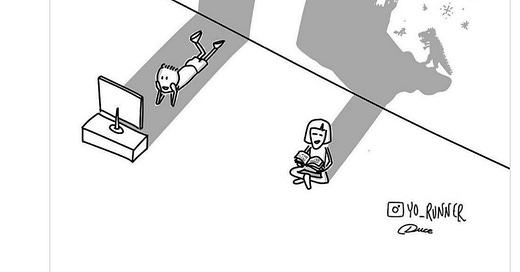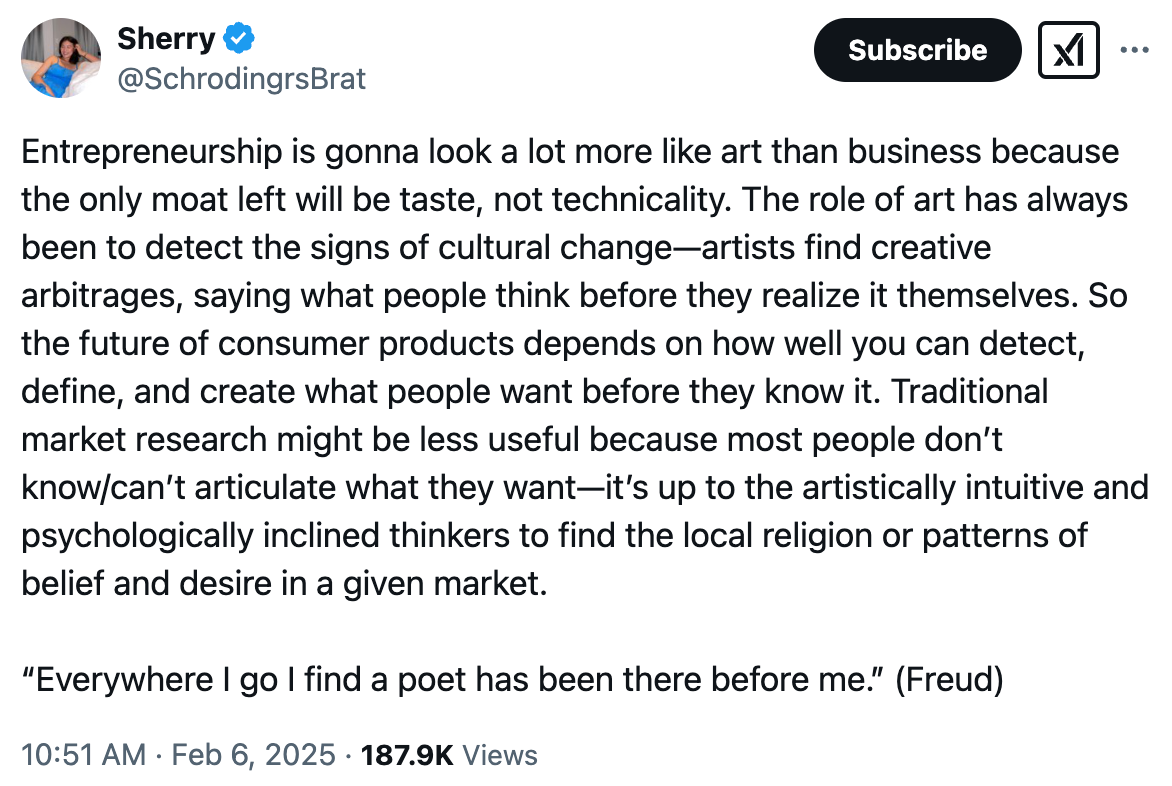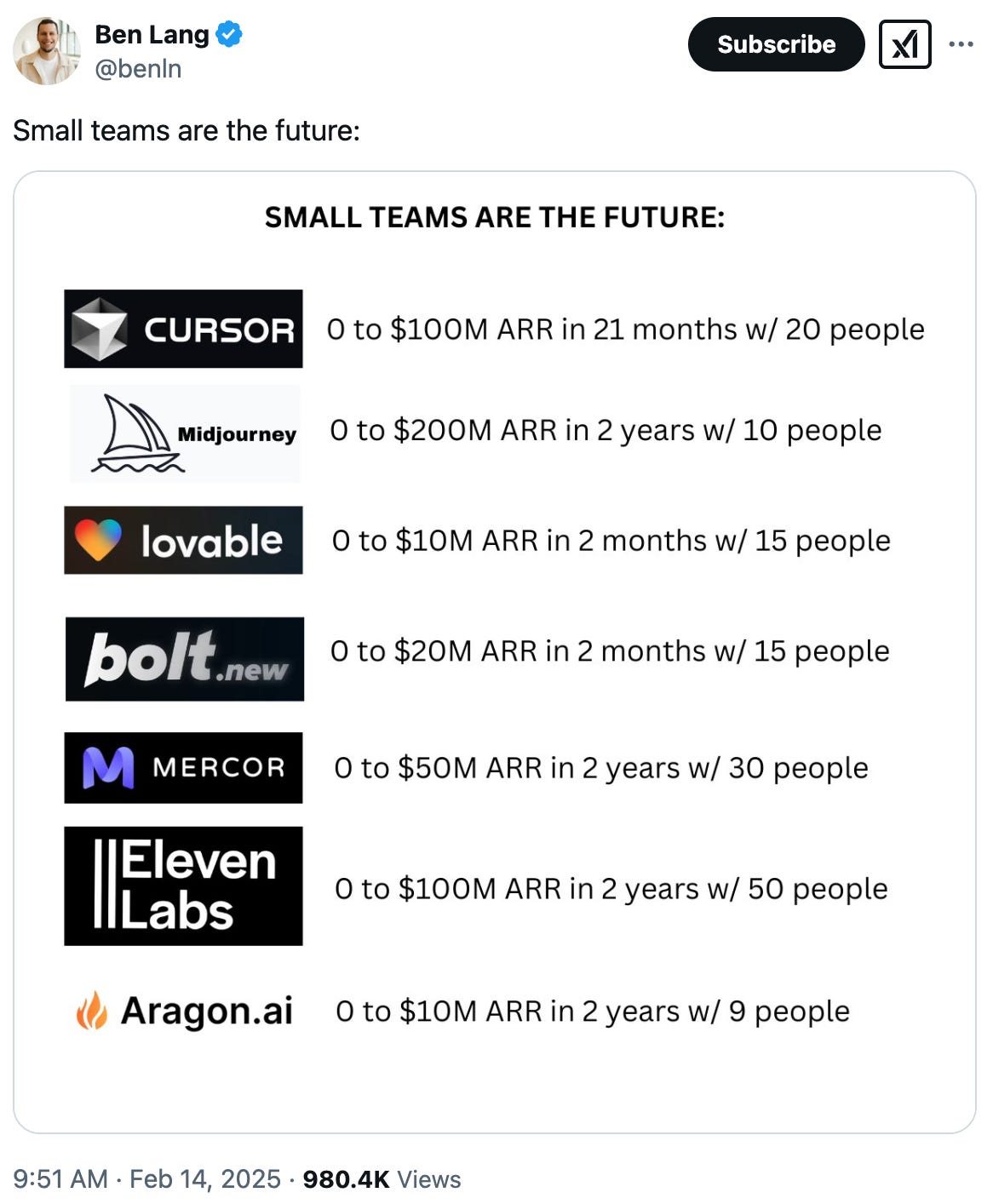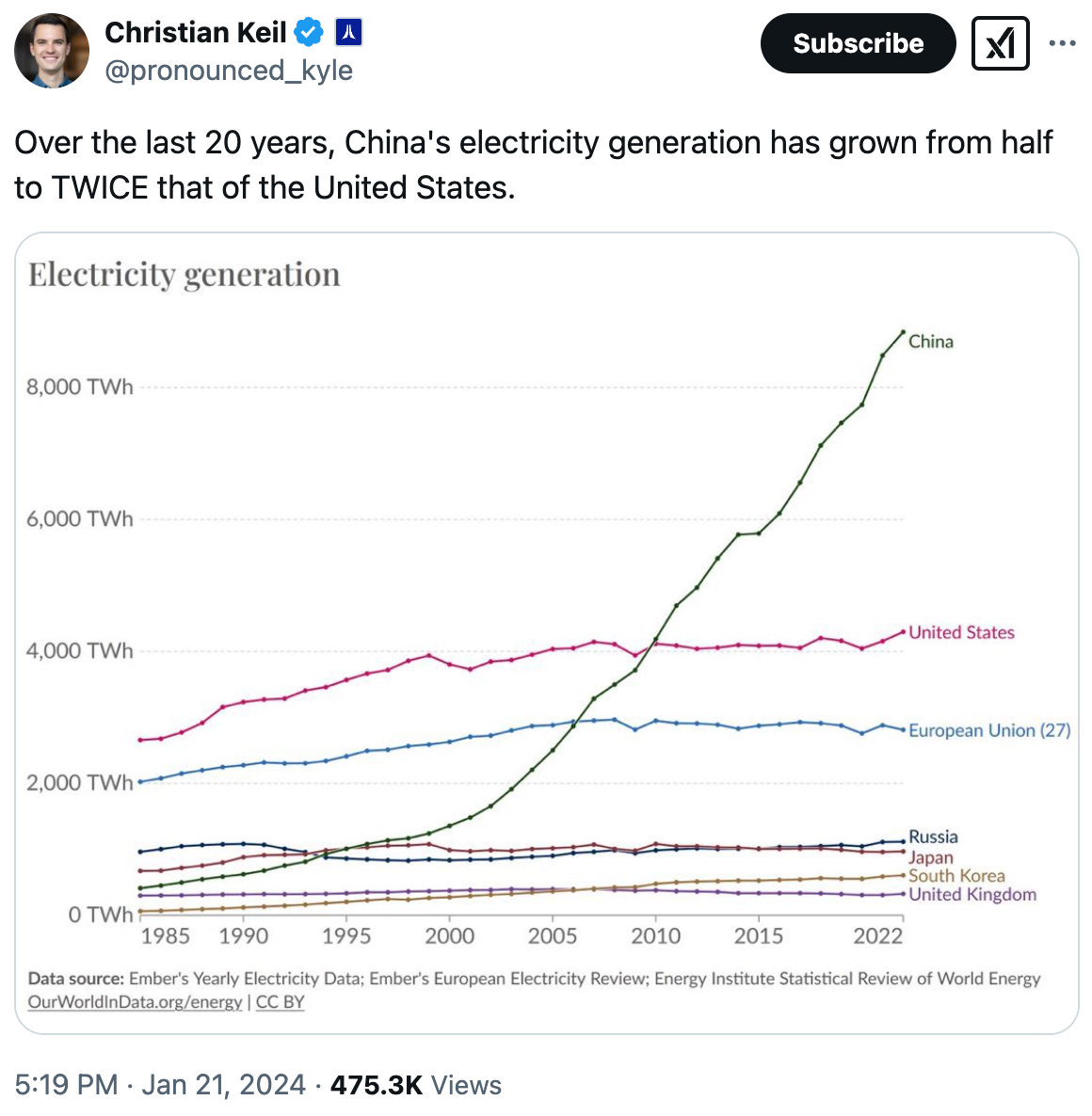Some AI Predictions
A very opinionated, cloudy gaze into the crystal ball of an abundant future.
I’m terrible at predictions. I've tried my hand twice at this. I revisited my 2010 predictions in 2020 and found that most of them were wrong. But I was soothed by the fact that they were wrong in such interesting ways!
Then I tried again. My 2020 predictions for the next ten years included this banger: "Nothing Much Happens With AI For At Least Ten Years".
Yeah. 🤣
In my defense, I had worked with ML models professionally and saw how well they worked on data in a very narrow domain, I just didn't see the massive scale and capability applying them to language would unlock.
The point is: take this amazing, prescient, remarkably astute, and perfectly clear set of predictions with a massive grain of salt. Because everyone is pretty bad at predictions. They're surprisingly hard because to say anything interesting as a prediction you have to talk about how the world will change. And most of the changes in the world are only obvious in retrospect. But that's why this exercise is so fun.
So, here's a set of predictions about how AI is going to change our lives over the next 5-10 years. I plan to avoid both the doomer and techno-optimist extremes.
Deep Work in high demand
Phones are destroying our focus. They train our brains to operate in the mode of context switching. We consume life in notifications. We get status bursts of 140 characters, conversations one text at a time, and swipe at 15 second videos if they don’t grab us in the first 2 seconds.
Deep work — the ability to sustain concentration for hours at a time — is becoming rare. There’s an “anti-affinity” between deep work and the context switching information consumption driven by our phones. You can only do one well at a time, and you have to train for it. As most people are addicted to their phones and constant information consumption, the skill of “deep work” is receding rapidly. The rarer it gets, the more sought after it will become over the next couple of decades. Creative generation of ideas, stories, computer programs, or physical things takes a lot of time in large chunks. This type of work will be in high demand.
Reading and writing are the keys to education
AI will flood the world with content. It’s already driving the dopamine and attention driven cycles of entertainment that prevent deep work and are becoming all-encompassing. Most people will let AI do their thinking for them. They'll consume what they're fed, their thoughts curated by machines.
Who can thrive in this flood? Readers and writers. They can sift signal from noise and think independently while others let algorithms think for them. Reading books builds independent thought. All of the action is built in your mind not provided to you on a screen. It becomes your scene and your vision of the story rather than someone else’s. Books are longer than other media too, and some thoughts are big enough that they can only fit in books. And writing is thinking on paper. Those that learn to write well, learn to think more clearly. If you want clear thoughts, write them down.
The twist is that AI makes English THE critical skill of the 21st century. It is the ultimate technical skill. Cursor and chop (chat-oriented programming) is becoming the de facto standard for building software, increasing the capabilities of every developer. And it’s the ultimate creative skill too. Prompt engineering and whatever comes next — the art of directing AI — is advanced English with a different audience. The best prompts include clear instructions, multi-step reasoning, output expectations, and context. Iterating on the process of working with an LLM requires rapid intake and analysis of the results to move to the next step of the process. The better you wield English, the better prepared you'll be in the future.
This wasn’t true a generation ago. When I was growing up, engineering and math were the keys to success. Now that’s table stakes. You still need to know some math to work with computers. But the real differentiator is how well you can read, write, and think independently.
Questions beat answers
What is a large language model? It is a giant high-dimensional set of numerical values (weights) assigned to all of the words (tokens) in our language. Somehow this enormous matrix has compressed and stored a huge percentage of all human knowledge — everything from a recipe for butternut squash risotto, to the history of maritime exploration, to the nature of prime numbers and its relationship to cryptography, to how to properly seat new head gaskets in a Ford Flathead V8 from 1948. An LLM is a miracle of compression. You are a few prompts away from nearly all human knowledge.
If you know how to ask the right questions.
More than that, you are a few prompts from synthesizing information across disciplines and learning new models and metaphors for understanding. The right questions will increase your creativity and bring you to new thoughts and new ideas. The definition of creativity will shift from "making something new" to "making meaningful connections." As AI can generate endless variations, human creativity will be more about choosing what matters and why.
Our schools have taught us for generations how to get the right answers. AI can do that now. The new key is knowing what to ask. And having the taste to recognize what matters.
Taste and judgement beat hard skills
Everyone says they want to be a writer. But then they hide behind excuses. A demanding job. The kids. Too tired to wake up early. The house is dirty. Yeah I make those excuses too. Because they all hide one terrifying truth: facing a blank page is confronting the possibility that you have nothing worth saying.
AI is making the implementation of anything in English trivial. It will spit out a 1,000 word essay on the historical context for Gulliver's Travels in a second flat. It will write beautiful React components with working event handlers. It will write you a perfect 14 line sonnet in iambic pentameter on any subject you choose.
But how will you know if it is any good?
When creation is cheap, the most important question becomes what to make. And why. Knowing that requires taste and judgement.
Paul Graham has written extensively on taste. And Art. And goodness.
Offline students will thrive. Online students will falter.
AI is a seductive technology. It can help you with your creativity. But it also offers to do your thinking for you. Too many people are using AI as a replacement for their own thoughts and skills.
It’s even worse if you start using AI before you ever learned how to think in the first place. If you start using these tools too early, your abilities will atrophy or even be prevented from forming in the first place. And you won't build any taste either. Humans only become good curators by first creating.
The core skills that form Bloom's pyramid need to be developed offline so the mind can do the hard mental work itself. This is the barbell approach: master the fundamentals before touching tools that amplify them.
But you must still be wary of a brutal truth: your brain can atrophy faster than muscle.
Companies will choose to stay small
"If you're not growing, you're dying." came from William S. Burroughs over fifty years ago. AI and automation is flipping the script.
Here's some examples:
The examples of successful tech companies we think of today are the hyperscalers. The Magnificent 7 have all scaled up to tens or hundreds of thousands of people. AI will make people rethink that size. The communication graphs of teams are quadratic. For every N people, there are N squared communication paths (N*(N-1)/2 to be precise). Communication is the hardest part of any organization.
A small team with AI can match the output of a much larger organization, without the communication overhead. For the first time in history, staying small might be the smartest way to grow big.
Energy use will soar
AI is hungry. It wants to feeeeeeeed. We are only two years into the GPT revolution and already Microsoft is leasing Three Mile Island for its datacenters. That’s just an appetizer.. we haven't even gotten to really big training clusters yet. And Chain of Thought is demonstrating that inference compute is going to explode exponentially.
We're somewhere just north of 4,000 TWh of capacity in the grid right now. Within five years we'll probably need to double that. We're only on track to add 60-100 GWh annually. We're going to need it all: nuclear, solar, wind, hydrothermal, natural gas, maybe even more clean coal.
There's only one country prepared for this. It’s not the US.
The live music revolution will continue
In a world where we can download every song and concert video instantly, Taylor Swift just wrapped her 2 billion dollar Eras tour. When we can stream any performance in perfect quality, why are we paying so much to see shows in person?
Because algorithms don’t deliver goosebumps.
Live performances give us something we are clamoring for: connection. We feel electric in the moment. When your favorite song hits and the whole crowd starts singing.. and you get to rediscover why you fell in love with it in the first place.
Human service will be elevated as pure luxury
The very wealthy barely touch their phones. Limited screen time and no protective case. They don't need it — their assistant handles all the digital details for them. In the age of automation, avoiding automation is the ultimate status symbol.
Automation is being commodified at a rapid clip. Anyone can buy a Roomba at Walmart. McDonald’s is replacing their workers with cold, heartless touchscreen kiosks. As machines take over our routine tasks, human attention becomes the scarcest resource. Those seeking elegance — the nouveau riche, the bourgeoisie, the aristocracy — will hire humans.
This is about more than simply service. It’s about social intelligence. It’s the ability to read a room, handle complex social situations, emotions, and navigate human dynamics. We’re headed for a craftsmanship renaissance too, where purely human-made items and human-delivered experiences command premium prices. Just as the industrial revolution made handcrafted furniture more valuable or the defeat of chess grandmasters to computer programs led to a rejuvenated interest in chess, the AI revolution will make human interaction more precious.
We’re catching up to what the Ritz-Carlton knew decades ago: "ladies and gentleman serving ladies and gentleman." In an automated world, that human touch is the ultimate luxury.
Smarter Than Any Human. More Patient Than A Saint. Ready To Build Anything. All In Your Pocket.
Soon there’s going to be an entity smarter than anyone you’ve ever met in your pocket. It will be infinitely patient. It can access all human knowledge. Reason through any problem. Write and deploy code. Solve equations. Generate customized novels. Analyze anything instantly. Ready always.
We’re about halfway there already. Agents and better base models are going to give us the other half.
When TV shows want to signal wealth, they'll show us someone driving in their car ordering some hardworking assistant by phone to handle a bunch of impossible tasks, like, yesterday. That’s everyone’s future. Except the assistant will be Einstein-level brilliant in whatever domain you need.
Need someone to book your flights and rent a car for your trip.
“Yes sir, handled and I got you a flight discount too.”
Need a custom app built to fix your company’s bottleneck?
”On your desk by 5, sir, already tested and deployed.”
Curious about commodities options performance given recent changes?
”Yes sir, here's your Monte Carlo simulation using this morning’s data.”
The best description for this I've heard is David Friedberg's notion of the Narrative Economy. You will narrate your ideas into existence, and AI agents will fill in the blanks, with tweaks and changes based on your judgement and values.
In this world, the real question becomes: what do you want to create? To make exist? What is its shape? What values matter?
This is a very exciting, very enticing new world. But here’s the catch: imagine describing the world of smartphones today, from twenty years ago:
"A computer faster than the fastest supercomputer with unlimited bandwidth to the entire internet. Any song or video on demand. Google search at your fingertips. A high-res camera and unlimited storage. Instant global communication by text or voice or video. All right in your pocket."
Sounds amazing. Revolutionary. But mostly we use these pocket miracles to scroll TikTok and laugh at memes and play games.
But that’s not the whole story. Not everyone settles. Not all the time. Maybe I’m naive, but I have higher hopes this time around. We have a chance to build and create some extraordinary things in the future.. if we focus on the right values. Deep thinking. Serious reading. Refined taste. Human connection.
The tools will be incredible. Will we be worthy of them?







